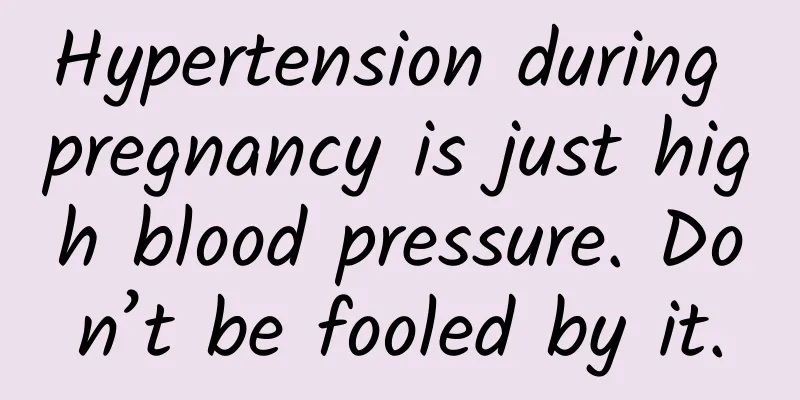What happens if my menstrual period stops after a few drops?

|
Every female friend will experience menstruation, but due to various reasons, some female friends' menstruation is not normal, and some female friends' menstruation only comes a few drops and then disappears. What is going on? Will it have any adverse effects on future pregnancies? Today I will tell you what happens when menstruation stops after a few drops of blood. ⒈ Early menstruation. Early menstruation means that the menstrual cycle is normal, but suddenly it becomes shorter than 21 days, and it occurs for more than 2 cycles in a row, but the menstrual volume is normal. It belongs to ovulatory functional uterine bleeding with biphasic basal body temperature, a short follicular phase of only 7 to 8 days, or a luteal phase shorter than 10 days, or a body temperature rise of less than 0.5℃. ⒉ Delayed menstruation: Usually menstruation is regular, but menstruation is delayed for more than 7 days, or even 40 to 50 days, and it occurs for more than two consecutive menstrual cycles, but the menstrual volume is normal. For those who ovulate, the basal body temperature is biphasic, but the follicular phase is long and the high temperature phase is low; for those who do not ovulate, the basal body temperature is monophasic. ⒊ Prolonged menstrual period: The menstrual cycle is normal, the menstrual flow is normal, but the menstrual period is prolonged, lasting more than 7 days, or even 2 weeks. People with inflammation usually have lower abdominal pain, which worsens during menstruation. They also have a lot of leucorrhea, which is yellow or yellow-white, thick, and has an odor. Those with incomplete corpus luteum atrophy also have heavy menstrual flow; those with prolonged endometrial repair still have a small amount of persistent vaginal bleeding after the normal menstrual period. ⒋ Menstrual disorders: irregular menstruation, early or delayed menstruation, and the cycle is either shorter than 21 days or longer than 35 days. ⒌ Intermenstrual bleeding (also known as intermenstrual bleeding and ovulation bleeding) refers to bleeding that occurs between two regular menstrual cycles. It is caused by a temporary drop in estrogen levels, which causes the endometrium to lose hormonal support and leads to endometrial shedding. The above is an introduction to what happens when menstruation stops after a few drops. For female friends who are menstruating, you must control your diet and not eat cold or spicy food. Do not let your menstruation become more and more severe because of your hasty mouth. |
<<: Recipe for eight months pregnant woman
>>: What should I do if I have back pain during my fourth month of pregnancy?
Recommend
What to eat when there is heavy menstrual flow and blood clots
A topic that is often discussed among women nowad...
What causes chronic pelvic pain?
Chronic pelvic pain is a common female disease. I...
What are the chances of an ectopic pregnancy? Parenting experts answer
Everyone knows the great harm of ectopic pregnanc...
Is the postpartum pelvic floor muscle examination painful?
Nowadays, many people are worried about going to ...
Can a graduate student become a teacher at an undergraduate university? In which university can a graduate student become a teacher?
Graduate school is too general. It depends on you...
What is the reason for high white blood cell count in pregnant women?
Pregnancy is a special period, which requires dif...
Will it be possible to get pregnant if you have sex when your period is almost over? Why?
We women need a very suitable psychological and p...
What should parents be wary of when facing respiratory infections in children?
With the arrival of winter, the number of outpati...
What to do if you have shoulder and neck pain? Five actions to effectively relieve
Shoulder and neck pain is a common phenomenon in ...
What does the black line on a woman's belly indicate?
Pregnancy makes every woman go through an unprece...
What is the best way to treat pelvic effusion? That's what happened
As we all know, there are many ways to treat pelv...
My breasts are too small, how can I make them bigger?
The breasts are the part of the body that attract...
A woman's back pain and buttocks pain
If a woman simply has back pain, there are many r...
How to reduce the size of the nipples?
Some women have very large nipples. If they don’t...
What are the reasons for the redness and swelling of the genitals?
When the itching symptoms of the genitals become ...









